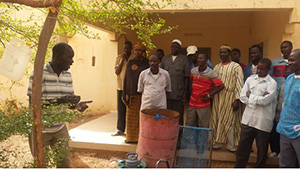
In each of SPRING’s 100 target villages in Mali, SPRING taught families about improving water, sanitation and hygiene (WASH) practices through social behavior change communication (SBCC) activities. WASH was part of SPRING/Mali’s multipronged SBCC approach, which focused on community-led total sanitation (CLTS), essential nutrition and hygiene actions (ENA/EHA), and farmer nutrition schools (FNS).
SPRING/Mali’s interventions took place from October 2014 to February 2016. The WASH activities focused on four behaviors: safely disposing of feces, handwashing, using only boiled or treated water for consumption by children aged 6 – 24 months, and ensuring children have clean play spaces.
Building tippy taps, or simple handwashing stations, was a significant focus of WASH trainings. Tippy taps are easy to build and are water efficient. SPRING/Mali stressed the use of soap, rather than using ash or just water, while handwashing. WASH activities recommend handwashing at five critical times: before handling or preparing food, before eating, before feeding a child, after cleaning a child, and after using the latrine. Families can easily install a tippy tap near kitchens and latrines, encouraging handwashing at recommended times.
Because these WASH interventions contribute to cleaner living spaces, incorporating them into daily routines helps reduce the likelihood of infections, which can cause diarrhea and lead to malnutrition.
During SPRING/Mali’s work, 4,686 tippy taps were built in 100 target villages in Mopti.